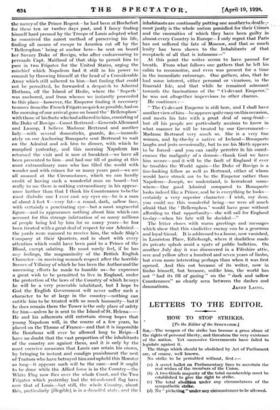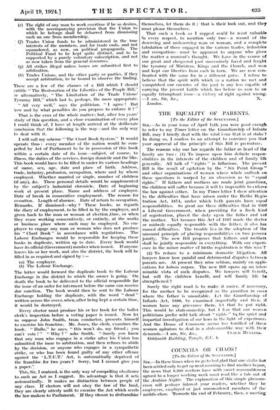LETTERS TO THE EDITOR.
HOW TO STOP STRIKES.
[To the Editor of the SPECTATOR.]
Sia,—The weapon of the strike has become a gross abuse of the rights of personal liberty, and threatens the very existence of the nation. Yet successive Governments have failed to legislate against it.
The things which should be abolished by Act of Parliament are, of course, well known.
No strike to be permitted without, first:— (a) A secret ballot on Parliamentary lines to ascertain the real wishes of the members of the Union.
(b) A two-thirds majority of the total membership must be established to give the right to strike.
(e) The total abolition under any circumstances of the sympathetic strike.
(d)-,No ",picketing" under any circumstances stances to be allowed.
(e) The right of any man to work overtime if he so desires, with the accompanying provision that the Union to which he belongs shall be debarred from dismissing such an One from membership.
(f) Trades Union funds to be administered in the true
• - interests of the members, and for trade ends, and not squandered, as now, on political propaganda. The Political Fund to. be kept quite distinct, and to be supported by a .purely voluntr.ry subscription, and not as now taken from the general resources.
(g) All strikes illegal unless issues are submitted first to arbitration.
(h) Trades Unions, and the other party or parties, if they accept arbitration, to be bound to observe the finding.
These are a few of the clauses of a Bill which I should entitle " The Restoration of the Liberties of the People Bill," or alternatively, " The Limitation of the Trade Unions' Tyranny Bill," which last is, perhaps, the More appropriate. " All very well," says the politician, " I agree ! But how and by what penalties do you propose to enforce it ? That is the crux of the whole matter : but, after ten years' study of this question, and a close examination of every plan I could think of, I have. at length arrived at the deliberate conclusion that the following is the way—and the only way to deal with it.
I will call my scheme ""The Chart Book System." It would operate thus : every member of the nation would be com- pelled by Act of Parliament to be in possession of this book within a certain date of its issue—subject, of course, to illness, the duties of the services, foreign domicile and the like. This book would have to be filled in under its various headings of name, sex, age, date and place of birth. Address, trade, industry, profession, occupation, where and by whom employed. Whether married or single, number of children fif any), .&c. These personal details would be supplemented by the subject's industrial chronicle.. Date of beginning work at present place. Name and address of employer. Date of break in consecutive employment. The reason for cessation. Length of absence. Date of return to occupation. Remarks. If dismissed—why ? These books, as regards the diary of employment, to be filled in by the employer, and given back to the man or woman at election ,time, or when they cease working consecutively, or entirely, at the works or business place . where such may be employed. No em- ployer-to engage any man or woman who does not produce his " Chart Book " in accordance with regulations. The Labour Exchanges would be responsible for keeping these books in duplicate, written up to date. Every book would have its official (Government) number when issued. if anyone leaves his or her work, and also the district, the book will be filled in as required and signed by :-
. (a) -The employer.
(b) The Labour Exchange.
The latter would forward the duplicate book to the Labour Exchange in the district -to which the .owner is going. On death the book to be delivered to the official responsible for the issue of an order for interment before the same can receive due sanction. The book would then be sent to the Labour Exchange holding the duplicate, with the word " dead " written across the cover, when, after being kept a certain time, it.would. be destroyed..
Every elector must produce his or her book for the ballot clerk's inspection before a voting paper is issued. Now let us suppose John Smith, . tram conductor, presents himself to exercise his franchise. Mr. Jones, the clerk, examines the
book. " he says, " this won't -do, my friend ; you can't vote ! " " Why ? " asks Smith. ”. Surely. you know that any man who engages in a strike after his -Union has - submitted the issue to arbitration, and then refuses to abide by the decision, or anyone who engages in a . sympathetic strike, or who has been found guilty of any other offence against the L.T.U.T.' Act, is automatically deprived of the franchise _for two years ? Sorry, but I cannot give you a paper .7.
This, Sir, I contend, is the only way of compelling obedience to.such an Act as I suggest. Its advantage is that it acts automatically. It makes no distincticin between people of any class. If electors will not obey the law of the land, they are clearly utterly unfit to exercise the Act which sends the law-makers to Parliainent. choose to disfranchise
themselves, let them do it ; -that is their look out, and they must please themselves.
That such a book as I suggest could be most valuable in every respect, to mention only two—a record of the deserving and undeserving man or woman, and a complete tabulation of those engaged in the various trades, induistries and occupations—must be apparent • to anyone who gives the matter a moment's thought. We have in the course of our great and chequered Fast successively faced and fought the tyranny . of Ministers, Kings and the Church, and won and kept our liberties from each in turn. We are now con- fronted with the same foe in a different guise. I refuse to believe that the spirit with which as a nation we met and vanquished our enemies of the past is any less capable of carrying the present battle which lies before us now to an equally triumphant issue—a victory of right against wrong.



































 Previous page
Previous page